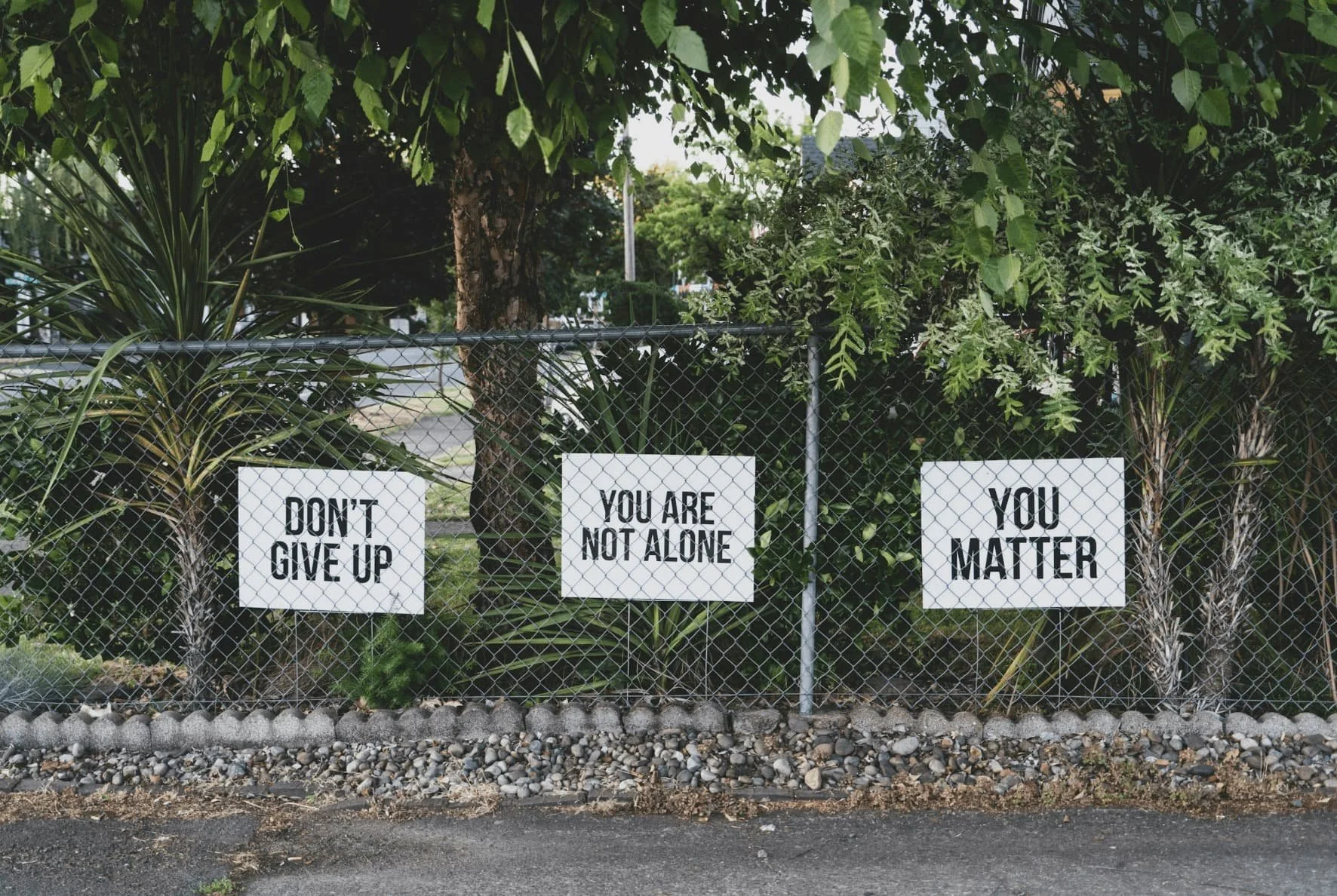When the World Is on Fire, How Do You Justify Therapy?
"You Matter" Fence Signs –Photo by: Samantha Sophia via Unsplash
What If Therapy Feels Too Small? When Helping Yourself Doesn’t Feel Like Enough.
I’ve been hearing this quite a bit lately. "How can I justify spending money and time on therapy when the world’s falling apart all around me?"
The climate is in crisis. Rights are being stripped away. LGBTQIA+ people and women are fighting harder than ever just to exist safely. Wars rage on, and every time you open your phone, there’s another headline that makes you want to scream. So, in the middle of all of that, spending an hour a week talking about your life, your stress, your trauma—doesn’t it feel a little... indulgent?
Maybe it even feels selfish.
I get it. If you’re the type of person who cares deeply about injustice, who feels the weight of the world, it’s easy to believe your own needs should come last. That therapy is a luxury when there are bigger things to worry about. That you should be doing more—marching, donating, calling representatives, organizing. And if you’re not doing that, you sure as hell shouldn't be sitting on Zoom talking about your childhood wounds or how your boss makes you feel small.
But here’s the thing: That mindset is bullshit.
The Pressure to Always Be Doing More
Women, LGBTQIA+ folks, and other marginalized people are conditioned to believe that our value is tied to how much we give. How much we sacrifice. How much we endure. We’re told—sometimes outright, sometimes in whispers—that we should be the ones fixing, helping, saving.
It’s no surprise that perfectionists and highly sensitive people (HSPs) feel this hard. You take on other people’s pain like it’s your own. You feel like you should be able to handle everything. You push through exhaustion because the world needs you. And when you’re drained and overwhelmed, you shame yourself for not doing more.
Sound familiar?
This pressure isn’t just personal—it’s political. Because if we stay exhausted and emotionally wrecked, we’re easier to control. Easier to silence. When we’re too burned out to fight, those in power win.
This is why therapy isn’t selfish. It’s strategy.
Therapy Isn’t an Escape—It’s an Act of Resistance
Taking care of yourself isn’t checking out. It’s not ignoring the world’s problems. It’s equipping yourself to engage with them in a way that’s sustainable.
Because here’s the truth: Burned-out activists don’t change the world. Depleted, anxious, trauma-saturated people don’t build movements. If you want to be part of change, you need stamina. And that comes from understanding your own patterns, healing from past harm, and learning how to take care of yourself while still giving a damn.
You can’t pour from an empty cup. But also? You don’t exist to pour for everyone else.
Personal Healing Is Political
For a lot of us, therapy isn’t just about personal struggles. It’s about unlearning the ways we’ve been conditioned to shrink ourselves. It’s about untangling the shame we’ve internalized from a world that tells us we’re too much, or not enough.
Healing yourself doesn’t just benefit you. It ripples outward. When you set boundaries, when you reclaim your voice, when you refuse to keep playing small—that impacts the people around you. Your family. Your relationships. Your community.
Look at history—every major social movement has been fueled by people who first had to break free from the stories they were told about themselves. Therapy helps you do that. It’s not about naval-gazing or endlessly dissecting the past. It’s about seeing how the past shaped you, and deciding what you want to do with that knowledge.
When Therapy Feels “Indulgent”
Still worried therapy is a luxury? Ask yourself this:
Would you call getting a physical for a chronic illness indulgent?
Would you tell a firefighter to run into a burning building without protective gear?
Would you shame a friend for needing support when they’re struggling?
Of course not. So why do you hold yourself to a different standard?
The world is heavy. And you being more exhausted, more anxious, more depleted doesn’t help anyone. You showing up as a whole, grounded, emotionally healthy version of yourself? That helps.
Therapy Helps You Find Your Version of Impact
Not everyone is built to protest in the streets. Not everyone is meant to run for office or be on the front lines of change. And that’s okay.
Part of what therapy can do is help you figure out what your version of meaningful action looks like. Maybe it’s mentoring younger queer folks. Maybe it’s quietly supporting a friend who just came out. Maybe it’s using your voice in your workplace or setting boundaries with a toxic family member.
Change happens in a million different ways. And sometimes, the most radical thing you can do in a world that wants you to be small is to take up space and take care of yourself.
The World Needs You Whole, Not Depleted
If you’ve been struggling with whether therapy is "worth it" in a time like this, let me leave you with this:
Your healing is part of the resistance. Your growth matters. And the world doesn’t need you to be perfect—it just needs you to be here, as your full self, for the long haul.
So if you’re in therapy, keep going. If you’ve been hesitating to start, maybe now’s the time. And if you’re still questioning whether you "deserve" that space?
Hell yes you do. Always.
Disclaimer:This blog reflects my personal views on mental health and is not a substitute for therapy. The content is general and may not apply to everyone. If you're struggling, please reach out to a licensed mental health professional.
